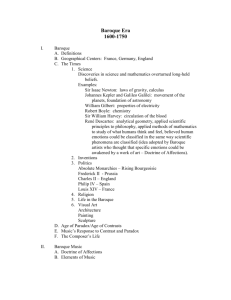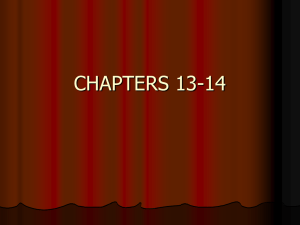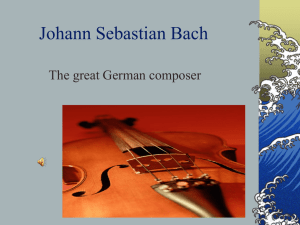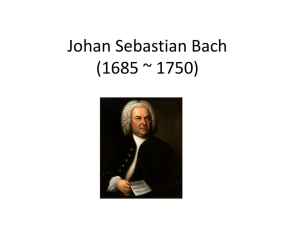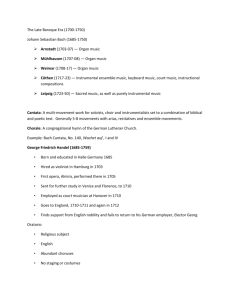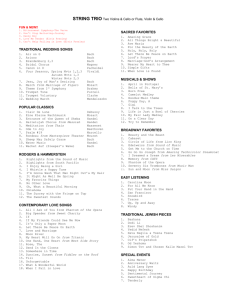Baroque Music (1600-1750)
advertisement
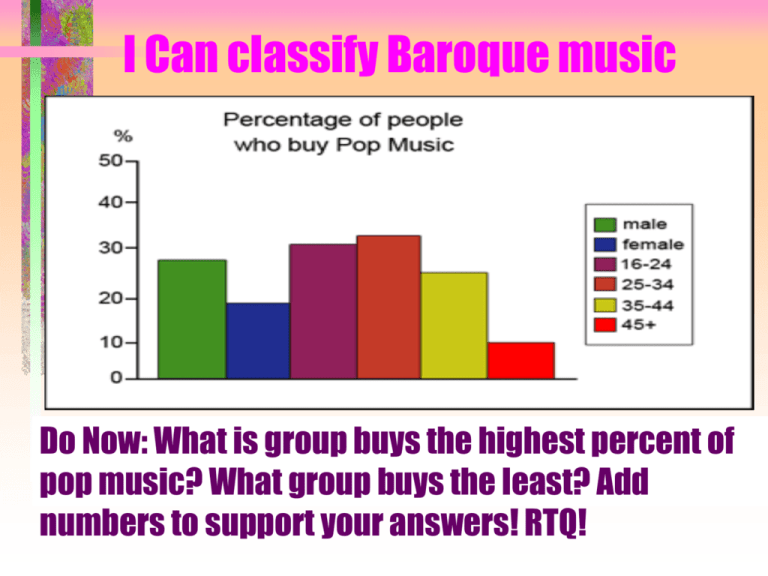
I Can classify Baroque music Do Now: What is group buys the highest percent of pop music? What group buys the least? Add numbers to support your answers! RTQ! Baroque Music Part 2 1600-1750 Henry Purcell • English Composer – 18= composer for the King’s string orchestra – Later=music director of Westminster Abbey. – Finally= music director at Chapel Royal • Wrote many different styles of music but is best known for his opera Dido and Aeneas Thy hand, Belinda; darkness shades me On thy bosom let me rest More I would, but Death invades me Death is now a welcome guest When I am laid, am laid in earth, May my wrongs create No trouble, no trouble in thy breast; Remember me, remember me But ah! forget my fate Listening: “Dido’s Lament” from Dido and Aeneas http://www.youtube.com/watch?v=ivlUMWUJ-1w HOT Question… With the people around you, discuss what this song means. The Concerto and Concerto Grosso • Concerto: piece for one instrumental soloist, string orchestra, and basso continuo – Usually has 3 movements • Concerto Grosso: piece for multiple instrumental soloists, string orchestra, and basso continuo – Like the concerto, has three movements The Concerto Grosso: Performers • Tutti- A word in music that means everyone plays • Ritornello- a main melody of a piece that will be repeated throughout a work • Ritornello Form– When a song alternates between soloist and full orchestra taking turns The Concerto Ritornello form • Three Movements 1. Fast & ritornello form 2. Slow 3. Fast & ritornello form Listening: Brandenburg Concerto No. 5 in D Major, by J. S. Bach http://www.youtube.com/watch?v =lhXHMzSOK5c Antonio Vivaldi The Red Priest Antonio Vivaldi - Life • Father was a musician • Was also a priest • Violin teacher, composer, conductor at girl's orphanage • Completely forgotten about until 1950! • 450+ concertos and concerto grossis The Four Seasons • Four concerti for violin and orchestra – – – – Summer Fall Winter Spring Listening: "La Primavera", (Spring) Movement one. http://www.youtube.com/watch?v =CcrrXHnN5uU Johann Sebastian Bach Johann Sebastian Bach (1685-1750) • German Composer – Comes from a long line of musicians – his sons- 4 became composers. • First big job- Music director for prince of Cöthen The Fugue: terminology • Bach invented the Fugue. • A fugue is a polyphonic piece of music based on one theme (melody) that is repeated throughout the work in a variety of different ways. – Fugues usually have “call and answer” sections • A theme is a short melody used to build a larger piece of music Listening: Toccata and Fugue in D Minor, by J. S. Bach http://www.youtube.com/watch?v =ipzR9bhei_o Bach in Leipzig • After Bach left Cothen, music director at St. Thomas Church in Leipzig, Germany. – Bach stayed here for his last 27 years. • He composed and rehearsed new music for each Sunday service and holiday service • Music education of 55 students at St. Thomas School Bach in Leipzig • Director of Leipzig Collegium Musicum – student organization – weekly concerts at a coffeehouse • Organ performer and technician – Gave concerts and organ manufacturers asked him to judge the construction of their organs. – Taught organ to private students Bach’s Lifestyle • • • • • Deeply religious (Lutheran) 20 children by two wives Blind from cataracts Today is Buried in St. Thomas Church Forgotten at his death – It wasn’t until 1829 that a composer dug up his work and everyone started to realize how great he was. Bach - St. Thomas Church Styles Bach Used • chorale: hymn tune sung to a religious text • cantata: for chorus, vocal soloists, organ and small orchestra Cantata • written for chorus, vocal soloists, organ and small orchestra. • text from the Bible or familiar hymns • used to reinforce the sermon • half-hour • included choruses, recitatives, arias, and duets. (all are also found in opera) • Bach composed about 295 cantatas Listening: Cantata No. 140: Wachet auf, ruft uns die Stimme http://www.youtube.com/watch?v =eC35GS88OqA Output • Music Director Day planner – Imagine yourself in the role of Johann Sebastian Bach, music director at St. Thomas. – Start with a wake up time of 9:00 AM and list each hour of the day until you go to bed at 10:00 PM – At each hour, write a short, historically correct sentence about what Bach would be doing.
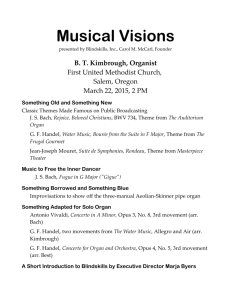
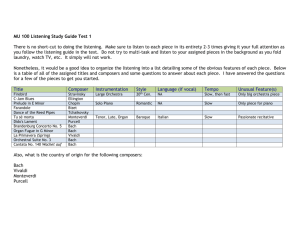
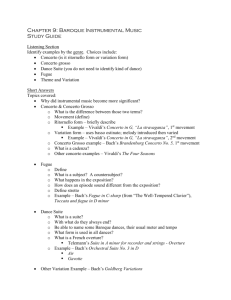
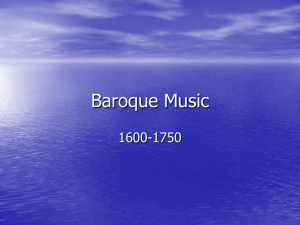
![QUESTION 6: Beatles [10]](http://s3.studylib.net/store/data/009758860_1-f81f55c5d34e2cd1e7ecfb9d98335c8f-300x300.png)
